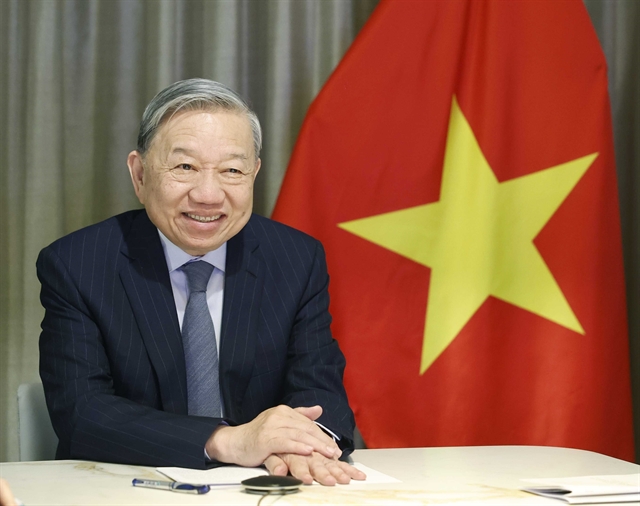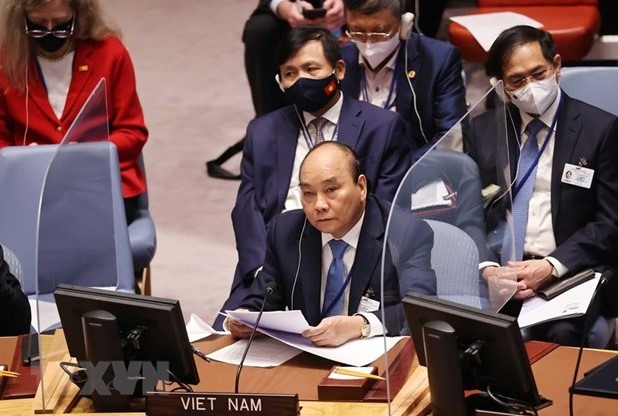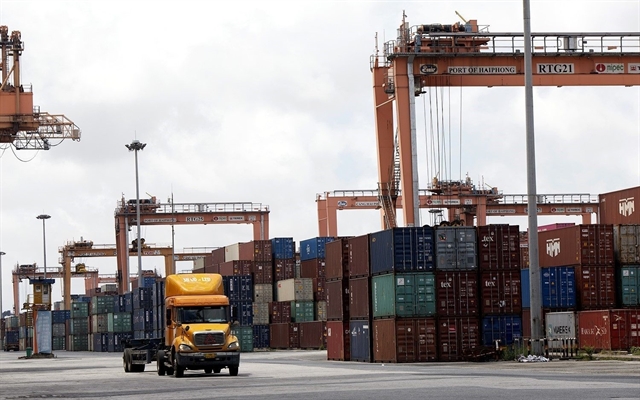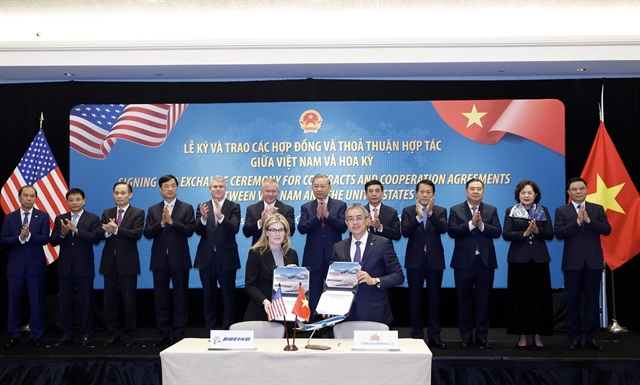 Politics & Law
Politics & Law

President Nguyễn Xuân Phúc on Thursday attended the United Nations Security Council Open Debate on climate security, stressing that it is a topic of strategic importance and immense relevance to our time.

|
President Nguyễn Xuân Phúc delivers his statement at the United Nations Security Council Open Debate on climate security. VNA Photo
NEW YORK - President Nguyễn Xuân Phúc on Thursday attended the United Nations Security Council Open Debate on climate security at the invitation of Irish Prime Minister Michael Martin, the rotating UNSC chairman, stressing that it is a topic of strategic importance and immense relevance to our time.
UN Secretary-General Antonio Guterres, heads of state, prime ministers and high-ranking representatives of Security Council member states joined the debate. At the session, the chairman and delegates expressed deep concern about the negative impacts of climate change on international peace and security, emphasising the need for the international community to strengthen response to climate change. The Secretary-General of the United Nations called on countries to intensify efforts to reduce greenhouse gas emissions, create breakthroughs in adaptation and enhance the resilience of nations and communities. The United Nations Secretary-General called on developed countries to fulfil their commitment to contribute US$100 billion per year to the Green Climate Fund, and called for increased multilateral cooperation to tackle the overlapping challenges of climate change and security, saying it is not too late to act to ensure that climate action contributes to international peace and security.
Addressing the session, President Nguyễn Xuân Phúc said “climate change represents the greatest global challenge of our time, and is shaping the future of mankind”.
It was taking up valuable resources meant for socio-economic development, and worsening poverty, unemployment and social inequality, he said.
“We are also witnessing how climate change is igniting disputes over natural resources between populations. They are displacing tens of millions from their homes to seek new livelihood, and triggering trans-border security threats of ecology, environment, food and water resources,” he said.
“These consequences may well erupt into geopolitical tension and instability, damaging peace, security, development and prosperity of states and nations. This is truly a ‘code red’ and a war without gunfire, so to speak, that causes economic damage and losses in lives no less dire than actual wars and conflicts.”
Against such backdrop, the Vietnamese President suggested three points that member countries should act vigorously:
First, the UNSC must uphold its leading role in establishing mechanisms for assessment, forecast and warning of climate security risks at the early stage and while they are still distant. This would help it proactively outline effective response strategies and measures. Conflict prevention, peace-keeping missions, and humanitarian assistance and post-conflict reconstruction efforts under the auspices of the UNSC must include climate security in a proper manner.
He proposed that the UN should establish a comprehensive database system on multi-dimensional impacts of sea-level rise in support of global response policy formulation.
“Second, the people's interest, especially that of vulnerable groups, needs to take centre stage if we are to harmoniously address the inseparable relationship between security, development and humanitarian activities,” he said. “Việt Nam strongly supports the full implementation of Resolutions 2532 and 2573 of the UNSC in order to achieve a global ceasefire as early as possible, and protect civilians and critical infrastructure in areas of armed conflicts.”
Third, he said member countries needed to continue to safeguard the sovereignty, key role and resilience of nations in climate change mitigation and adaptation efforts. They also needed to step up international cooperation to supplement and coordinate resources to effectively realize the 2030 SDGs, the Paris Agreement, and other key international treaties.
They must resolve to cut greenhouse emissions, in which developed countries should take the lead. Ample resources should also be set aside to provide developing countries with assistance in financing, technologies and know-how, so as to ensure that no country is left behind in the common fight against climate change.
He said Viet Nam was one of the countries hardest hit by climate change. Successive natural disasters had caused great losses in life and property. The Mekong Delta, the heart of Việt Nam's agricultural production, was witnessing a record episode of droughts and saline intrusion, jeopardizing the livelihood and everyday life of 20 million people, as well as food security of the entire country and region.
“For this reason, to realize its aspiration and vision for national development, and perform its duty to the international community, Viet Nam is determined and strongly committed to taking climate action, and developing a green, sustainable and low-carbon economy as pledged at the COP 21,” Phúc said.
“Việt Nam supports all efforts to respond to climate-related challenges at the UNSC, at multilateral forums, and at other cooperation arrangements at the bilateral and regional levels. We hope to continue to receive assistance in resources and policy advice from international friends so as to better fulfil our commitments.”
He was convinced that through international commitment and solidarity, all countries would take bold actions towards a greener and more sustainable future. VNS




